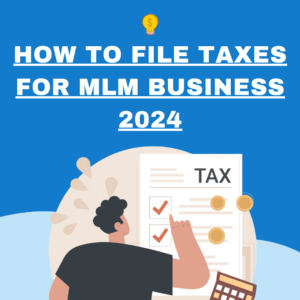multi level marketing tax tips، offer a roadmap to navigate the intricate terrain of tax obligations for MLM entrepreneurs. Whether you’re a seasoned network marketer or just starting your journey, understanding the nuances of taxation can significantly impact your bottom line. In this article, we’ll delve into expert strategies to help you optimize your tax returns, ensuring that you keep more of your hard-earned income while staying compliant with the law. From deductible expenses to leveraging tax breaks, embark on a journey towards financial empowerment and peace of mind.
1. Document Everything
Keep meticulous records of all business-related expenses, including product purchases, marketing materials, travel, and training expenses. Detailed documentation will help you maximize deductions and stay organized during tax season.
2. Leverage Home Office Deductions
If you operate your MLM business from a dedicated space in your home, you may be eligible to claim home office deductions. Calculate the percentage of your home used for business purposes and deduct related expenses such as rent, utilities, and maintenance.
3. Understand Deductible Expenses
Familiarize yourself with the IRS guidelines on deductible expenses for MLM businesses. While legitimate business expenses are deductible, personal expenses are not. Be cautious and ensure that you’re only deducting expenses directly related to your MLM business.
4. Maximize Travel Expenses
If you travel for MLM events, conferences, or meetings, you can deduct related expenses such as airfare, lodging, meals, and transportation. Keep thorough records and be prepared to demonstrate that your travel was primarily for business purposes.
5. Claim Training and Education Costs
Expenses incurred for training programs, seminars, and educational materials directly related to your MLM business are generally deductible. Stay up to date with industry trends and invest in your professional development while reaping tax benefits.
6. Separate Personal and Business Finances
Maintain separate bank accounts and credit cards for your MLM business to streamline record-keeping and avoid commingling funds. This separation makes it easier to track business expenses and ensures accurate tax reporting.
7. Consider Retirement Contributions
Explore retirement savings options available to self-employed individuals, such as a Simplified Employee Pension (SEP) IRA or a Solo 401(k). Contributions to these accounts are tax-deductible and can help you save for the future while reducing your current tax burden.
8. Consult with a Tax Professional
MLM tax laws can be complex, and regulations may vary based on your specific circumstances. Consider seeking guidance from a qualified tax professional or accountant with experience working with MLM businesses. They can provide personalized advice, help you navigate tax laws, and ensure compliance with regulations while optimizing your tax strategy.






